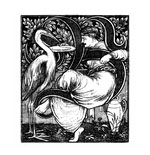
The Trinity & the Moral Life
HABITS MADE OF IRON
During the horrible years of the Holocaust, when Jews were being arrested and shipped to an uncertain fate in Eastern Europe, the people in a small mountain village in southcentral France collaborated to harbor, protect, hide, and ultimately save thousands of Jewish refugees from imprisonment and death. What happened in this town remained largely unknown until historian Philip Hallie wrote Lest Innocent Blood Be Shed: The Story of the Village of Le Chambon and How Goodness Happened There (1979). Shortly before his death in 1994, Hallie wrote a series of essays for a book titled In the Eye of the Hurricane: Tales of Good and Evil, Help and Harm. In one essay, “Magda and the Great Virtues,” he recounted again, with even greater eloquence and the benefit of hindsight, his encounter with the villagers.
I use Hallie’s essay in my class on “Christ and the Moral Life” to propose to my students that every moral act is a participation in the threefold communion of love that has existed from all eternity in the Triune God. I suggest that the relationship of these villagers to God and God’s law was not one of servant to master but Son to Father. And if, as Josef Pieper has written, the “whole point of a Christian’s life is to become like Christ,” then these villagers serve as a prime example of what that means.
But what made their actions possible, I tell my students, is grace, which, as St. Thomas Aquinas says, is the presence of the Holy Spirit by whom “the love of God is spread abroad in our hearts.” Not only did this gift of the love shared between the Father and the Son in the Person of the Holy Spirit make it possible for these poor, humble, mountain villagers to obey the commandment to “not kill” and “protect innocent life,” it worked in them preveniently, preparing them in advance with the virtues and dispositions they would need to mourn the sorrows of the Jewish people, to be merciful, and to hunger and thirst for righteousness for the strangers who came to their doors. (This is also, by the way, a lesson in the Beatitudes.)
Before we get to the Trinity, let me recount some details about the village.
You May Also Enjoy
In our October symposium, Thomas Molnar, an authority on all things French, threw out the…
Does the Church offer salvific truth and grace, or can we do away with that, and instead just rely on knowledge gleaned from myth, psychology, and experience?
God has created a cosmos in which we may move freely, but He has cleverly rigged the game, at a few key moments, to set up the result He wants.

